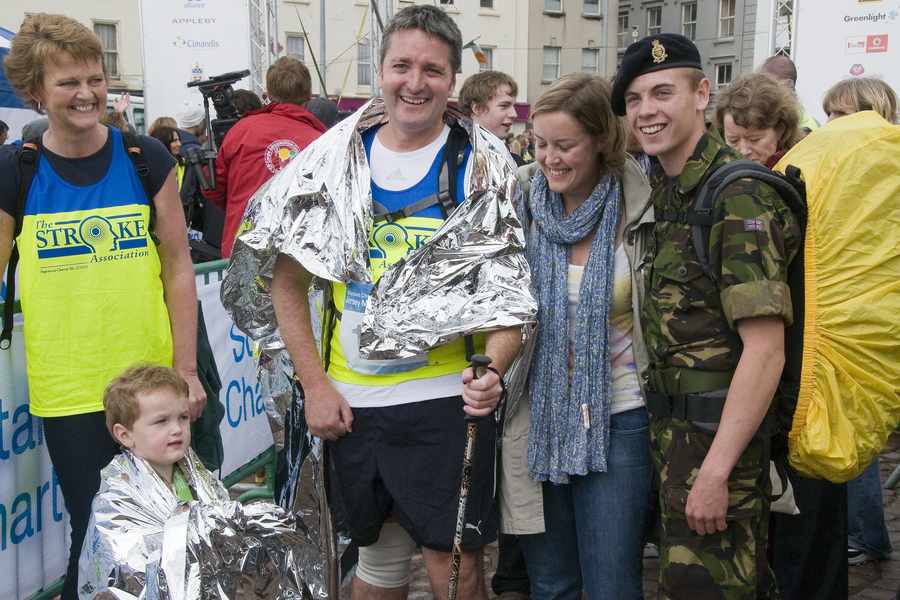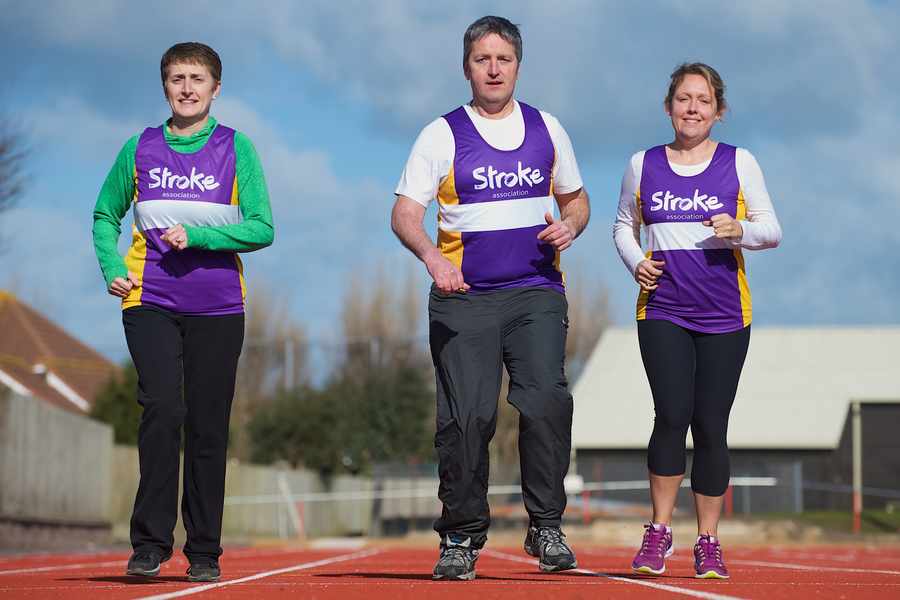This is what Anthony Lewis says of his latest challenge – to run all 26.2 miles of the Jersey Marathon on Sunday 4 October.
The first question seems too obvious. Why?
With the help of his iPad (which is equipped with an app which speaks with an electronic voice), Anthony says: ‘Marathon 2010 is walking. London Paris bike 2012. Running is October marathon. My children, Rhys, Joe and William. Pride. Suzi. Pride.’
- 2007 Anthony suffered a massive stroke, leaving him physically disabled and with severe aphasia.
- 2010 He completed the 26.2-mile Standard Chartered Jersey Marathon, walking the course in stages and raising £25,000 for charity.
- 2012 – Anthony and 119 supporters completed a 320-mile cycle from London to Paris in aid of the Stroke Association and Driving for the Disabled.
- 2012 He won the Adult Courage Award at the Stroke Associations annual Life After Stroke Awards. He was named the winner from 85 nominees.
- 2015 – Anthony is aiming to run all of the Jersey Marathon on Sunday 4 October.
‘He wants to do something that makes his family proud,’ his partner, Suzi Austin, explains. ‘We’re proud of you anyway,’ she adds. ‘The things that – I hate to use the word normal – but the things that in a normal family unit a dad might do, Ant can’t do all those things.
‘I think he just needs to be able to say to the children, I can’t do that or that, but I have accomplished this.’
Following a severe stroke in 2007, former JEP assistant editor Anthony has been unable to work and was left with aphasia, a condition which affects both spoken and written language use.
Their first child, Joe, was just a baby when Ant had his stroke. How much of a boost was it having William two years ago?
‘Ah, just lovely,’ he says. As if on cue, we hear a little cough on the baby monitor from William as he naps upstairs.
‘We never thought we’d have him,’ Suzi said. ‘Joe was seven months old when Ant had his stroke and things were just so difficult. I think I had accepted that our circumstances meant we weren’t going to have any more children.
‘So when William did come along it was incredible – even if he did have colic for the first six months. It’s fair to say that the boys are your motivation.’
‘Yes, yes,’ he says.
‘Having a seven-month-old baby and in some ways being almost forced to do things that you might not have done, like sit on the floor and play, wanting to get yourself stronger, in order to get outside and be able to kick a ball, to be able to go upstairs for bathtime – it was all therapy in a way,’ Suzi says.
‘When Ant first came home, he came downstairs and that was it for the day because it was too painful and too much effort to go up the stairs again until bedtime.’

And yet here we are today talking about Ant’s next challenge – running a full marathon. Apart from his boys – he also has Rhys, who is now 21 – his other motivation is to raise awareness of strokes and aphasia.
‘There have been some great campaigns for heart attacks, for example, yet the equivalent of a brain attack is still not so well-known,’ Suzi said.
There have been moves towards rectifying that, not least with the FAST campaign, which ran nationally on TV, using an acronym to help members of the public act on the signs of a stroke: Face, Arms, Speech, Time.
The stroke has left Ant with permanent disability, but his big challenges are what drive him. In 2010 he walked the distance of the Jersey Marathon over the course of a week, raising £25,000 for charity. Two years later, joined by more than 100 others, he cycled 320 miles from London to Paris, raising £100,000 for the Stroke Association and Driving for the Disabled.
‘Challenge,’ he says. ‘Right weakness arm and leg. Difficulties with walking and running. Pain. Muscle ache. Fatigue. Personal goals, and excited but scared. Give others hope, always hope.’
‘It would be very easy for Ant to sit on the sofa and feel sorry for himself, but that’s not who you are, and it never has been,’ Suzi said. ‘I think you’re happier and more able to deal with the everyday challenges of having a stroke when you have something to focus on.’
Ant is, however, reluctant to go into too much depth about challenges he faces every day of his life. ‘Pain? Yes, but come on,’ he says, as if to move on to the next question.
‘The fact is that Anthony wakes up every day with pain and he goes to bed every night with pain, and he tosses and turns at night in pain. He doesn’t like to think about it and he likes to brush it off, but that is part of daily life,’ Suzi says.
One of the frustrations faced by Ant is that he experiences fits, and every time that means he has to stop driving for 12 months. He had one a month after William was born. And last November, just three days before he was due to get his licence back, he had another. It happened while he was sitting at the breakfast table with Suzi and the young boys.
‘It was very distressing, particularly for Joe, who is so much more aware now,’ Suzi said.
Although the seizures temporarily stop him from driving, Ant and Suzi always notice positive changes after them. Opinion is divided in the medical profession as to what connection there may be, but, they say, it cannot be denied that Ant’s speech has improved each time.
Ant has resumed speech therapy and Suzi says he is now coming up with words that she hasn’t heard him speak in seven years.
‘We went to France with some friends last summer, and we were driving through a village and he said “pretty” and he hadn’t said that word since the stroke.’
Joe will sit down with his father to help him with speech and language. Ant will do mirroring exercises with him, looking at his lips and trying to copy the word.
‘Joe is so sweet when he does it,’ Suzi said. ‘He has started asking questions, and has noticed that daddy is different from other dads. He thinks he’s a very special dad.’
Ant sits on the Stroke Association committee, and so knew quite early on that the 2015 Jersey Marathon, in its tenth anniversary year, was going to support the Stroke Association in Jersey as well as the sponsor’s own global charity, Seeing Is Believing.
‘I could be wrong here, but I have a suspicion that ever since he walked it he’s been thinking, hmm one day I might run it,’ Suzi said. ‘Sometimes you have just got to give it a go. We never thought you would get back on a bike – and that took some doing.’
Ant, who hasn’t set himself a fundraising target, is already working with neuro-physiotherapist Sally Lyons in training, as his knee has to be strapped and his ankle put in a brace. He laughs when he adds that he has to have shaved legs for this.
‘He has no control over his right hip, knee, ankle, toes,’ Suzi said. ‘It’s all new territory though – because most stroke survivors don’t want to run!’
He is already up to running five miles – 20 times around the track at FB Fields. On marathon day he will start earlier than everyone else, probably at 7 am in order to complete it in about seven hours, finishing with other runners and being spurred on by the crowds.
He hopes that when people see other stroke survivors taking part – including primary school teacher Nicole Le Mière – other people will join in.
Suzi adds: ‘It’s hard to say no when you’ve got someone who’s had a stroke saying, well, I’m doing it … what’s your excuse?’
‘Come on!’ Ant says.
So he has cycled, run and swum (he was in the Swimarathon in 2012). What next – a triathlon? Suzi sighs, but there is just a glint in Ant’s eye that suggests he has already thought of that. ‘Well … swim, bike and run. Yeah, come on!’

With all this positivity, it is hard to remember just how far Ant has come. How long did it take to come to the point of acceptance?
‘Two years,’ he said, adding ‘work’ and ‘speech’ being the two things that he had to get his head around.
‘Work is such a gaping hole that has been left,’ Suzi said. ‘When he’s doing a challenge that gaping hole is somewhat filled because he is occupied thinking about something else.
‘It’s not just about getting up and going to work. There’s so much more to being a journalist – you’re out and about, you’re meeting people and there’s a real buzz on deadline. It’s creative, it’s so many things, and it was who you were for so long. And it always will be – you still miss the writing. Having an opinion doesn’t go away just because you’ve had a stroke.’
Suzi too has had to give up work to be Ant’s carer – something, she adds, that he hates. ‘Being realistic for a moment, there’s a lot he can’t do, and I can’t leave the boys with him, the driving is a big issue, and the not being able to pick up a phone and dial 999 if something happened.
‘I don’t know if you ever completely accept something like that, but you have come to terms with not going back to life as it was,’ she said. ‘Admittedly there are good days and bad days. Good days are where you do look on the positive side and see the silver linings. Progress has been incredible when you look back at Day One. And then other days inevitably where you want to do something that you can’t or you just want to express something.’
‘Joe and William,’ Ant interjects.
‘On a bad day you think of the boys and that’s what gets you through,’ Suzi says. She admits that she is doing a bit of running but quickly pushes aside any suggestion that she will be running alongside Ant on marathon day – despite his cajoling that she really could fit in the training.
You thrive on these big challenges, don’t you, I ask. ‘Well … yes, just … happy. Hard. Five miles. Come on!’
Read about Ant’s progress in his training diary in the JEP every week from next Saturday.







